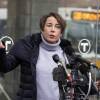Standing in the same spot where she gathered 55,000 protesters in June, community activist Monica Cannon-Grant once again raised a megaphone to her lips to speak about racial injustice at a vigil in Boston's Franklin Park Wednesday night.
“Let’s be clear, we’re not going to sugar-coat it — they’re killing us,” Cannon-Grant said to the crowd of around 100 people. “If you’re Black, it is a crime at this point.”
The crowd gathered just hours after the news of a grand jury decision in the case of Breonna Taylor, a Black woman who was fatally shot multiple times in her home by three white police officers in Louisville, Ky., in March. None of the officers were charged with her death. The grand jury indicted one former officer, Brett Hankison, for wanton endangerment after he shot his weapon in the direction of a nearby apartment with three people inside. The other two officers involved in the shooting, Sgt. Jonathan Mattingly and Detective Myles Cosgrove, who fired the shot that killed Taylor, were not indicted.
Dorchester resident Dina Willis stood behind a hand-written sign reading “Justice for Breonna Taylor” and watched as members of the crowd began to pass out candles. “I feel like crying, it's crazy that we even have to do this,” Willis said. “It could have been my daughter. It could have been me. It could have been anybody. And they don't even care about us.”
Taylor was a 26-year-old emergency room technician. The grand jury's decision Wednesday came more than 100 days, and countless protests, after her death.
Though the incident occurred in Kentucky, Cannon-Grant says the impact of this decision will be felt around the country, including in Boston.

“We're one incident away from Ferguson,” Cannon-Grant said in an interview with GBH News. “Situations like this happen and then we're protesting, but in a minute, Black folks are going to stop asking for equality and want revenge, because we're tired.”
Cannon-Grant organized a protest called “Protect Black Women” on Tuesday night outside the Boston Police Headquarters after receiving more than 250 death threats and other forms of online harassment after she organized several Black Lives Matter protests over the summer. “It’s like, don't wait until I become a hashtag to advocate for my life,” she said. “Fight for me while I'm still here.”
Cannon-Grant also criticized Gov. Charlie Baker’s decision in June to authorize $500,000 to create inclusion and diversity training within the Boston Police Department.
“I want Governor Baker to defund Boston Police and his state police department,” Cannon-Grant said, addressing the crowd. “He made a decision to give officers bonuses to do something that they should have been doing anyway. … He said, here’s five hundred thousand dollars, stop killing Black folks. That's what he did. It's disrespectful.”
Ashawn Dabney-Small, an 18-year-old Black man who is running to unseat Boston City Councilor Frank Baker in Dorchester, criticized the city councilor’s response to issues impacting marginalized communities.
“I want to call out Frank Baker for not doing his job and being able to be an advocate for all,” Dabney-Small said. “How are you supposed to be an advocate when you go around saying you’re going to do something and then contradicting yourself and doing other things when it comes to people who actually need your support? Especially on the rent moratorium, you voted no. People were losing their housing. People were on the street.”
Boston Mayor Marty Walsh responded to the grand jury decision during a news conference Wednesday afternoon, saying that he anticipated more local protests in the wake of the news. “I think it's really important for people to have their voices heard, and I think it's really important for people to hear what people are saying,” Walsh said. “That's the beauty [of] free speech.”
“In February, when we first got a [COVID-19] case in Boston, Breonna Taylor and George Floyd were alive,” Walsh continued. “There's been a lot of conversation and concern in this country and dialogue about systemic racism. I stood at this podium a few months ago and talked about what we can do in Boston. I wish I could do something greater, on a global scale or a nation-wide scale, but we can't. What we can do is have our voices heard, and I think that's really important.”
City Councilor Michelle Wu, who recently announced her campaign to unseat Walsh, attended Wednesday’s vigil and renewed her call to re-allocate funding from the Boston Police Department into community-led initiatives.
“Breonna Taylor was murdered in her sleep, and today, our so-called justice system decided that the people who were protesting this injustice will spend more time in jail than the people who took her life,” Wu said in an interview with GBH News. “The system has to change, and we’re here to push for a system that is no longer built on systemic racism and oppression.”
As the crowd began to disperse, activists announced follow-up protests and vigils taking place around Boston this week, urging the community to show up in numbers. Ruth Omotunde, a protester who attended several demonstrations throughout the summer in the wake of George Floyd’s death, said she feels “moved” to continue protesting.
“Some people have grown a little bit tired of waiting, and have resolved to fight in other ways, but this doesn't take away from how important this is,” Omotunde said. “But the significance of these gatherings is still great. I'm encouraged by the fact that people are still willing to fight after all this time.”





